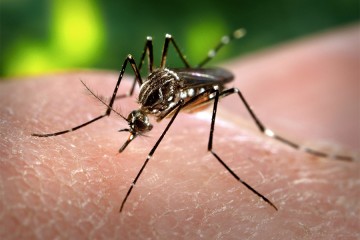Experts gathered last week at a Johns Hopkins Bloomberg School of Public Health symposium to address the Zika virus, explore emerging evidence, and evaluate the public health response. Presenters focused in particular on evidence that Zika virus is linked to birth defects, a connection supported by strong anecdotal evidence. But a number of questions remain about the nature of the virus, how it spreads, and how to quell the current outbreak.
Below is a closer look at some of what the experts had to say last week.
How fast can we develop an effective vaccine?
Steve Whitehead from the Laboratory of Infectious Diseases at the National Institute of Allergies and Infectious Disease presented the standard pathway for vaccine development, which includes evaluating animal test models, preparing materials, and conducting three phases of human testing to ensure safety and efficacy. A Zika vaccine following this pathway could take at least five years, he said.
For perspective, Whitehead noted that it has taken more than 15 years to develop a Dengue fever vaccine. Around the world, at least 17 laboratories are currently testing Zika vaccine approaches, and JHU's Anna Durbin, an associate professor and researcher in the Department of International Health, said she is confident that a vaccine will be in clinical trials by the end of 2016. But its unclear what stage of the process the vaccine will be in at that point, and who among the affected populations will be eligible for the vaccine once its available.
After a woman is infected, how long should she wait to get pregnant?
"We do tell women that if they were infected more than four weeks prior to pregnancy, we don't expect them to have any fetal effects," said Jeanne Sheffield, director of the Division of Maternal-Fetal Medicine at the Johns Hopkins School of Medicine. "But as you know, every five minutes it seems a new report is coming out, so we keep changing the recommendation."
What are the rates and routes of infection?
The Washington Post reported Tuesday that the CDC is investigating 14 potential cases of sexually-transmitted Zika in the U.S. Two patients have been confirmed, four have tested positive for the virus and are awaiting confirmation, and eight are currently under investigation. More than one of these cases involves a pregnant woman, though the exact number of pregnancies and where these patients live was not disclosed. These reports support evidence that Zika, which in some cases can be found in semen, can be transmitted from male to female sexual partners. However, scientists have yet to confirm whether a female host can spread the virus to her sexual partners.
In addition, scientists are studying how often infected mothers pass the disease to their fetus and the likelihood that a Zika-infected fetus will then develop microcephaly. Albert Ko, of the Yale School of Public Health, is working to analyze data from more than 700 mother-infant pairs from Brazil to determine the rates of infection and subsequent rates of microcephaly. The Pan American Health Organization is studying more than 2,000 pregnant women in Colombia whose pregnancies will reach full term in June.
Sheffield noted last week that although the CDC's recommendations are subject to change, at this time scientists do not believe the virus is transmitted through mucosal routes, meaning that the virus cannot be delivered to a newborn through an infected mother's breast milk. Zika RNA has been detected in breast milk in some cases, but "even if there is virus in the breast milk, the chance of transmission would still probably be pretty low," Sheffield said. Studies are currently under way to determine whether the virus is present in cervical secretions that could infect a baby during delivery.
What are the ethical implications of the Zika outbreak?
"Brazil has very strict abortion laws, probably the strictest in Latin America," Ko said. "It also has one of the highest rates of illegal abortions—obviously because of the strict rules—and it also has [one of] the highest rate[s] of female death because of abortion."
Ruth Faden, director of the Johns Hopkins Berman Institute of Bioethics, called inadequate access to contraception in parts of Central and South America during this crisis a "totally unacceptable situation."
Pope Francis recently weighed in despite the church's ban on contraception, suggesting that Brazil, a Catholic country, promote the use of contraceptives to delay pregnancies and stop the sexual transmission of Zika virus. He stated that "avoiding pregnancy is not an absolute evil," though he reiterated the Catholic belief that abortion is "evil" and a crime.
Posted in Health, Science+Technology
Tagged epidemiology, zika virus










